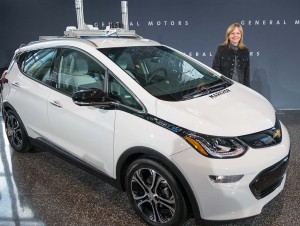
GM President Dan Ammann says the company will produce more electric vehicles in the near future, but was short on specifics.
Fresh off another victory for the new Chevrolet Bolt EV – which was named the car of the year by syndicated TV show Motor Week – General Motors is exploring options for adding still more battery-electric models to its line-up.
While company officials are vague about both the details, numerous sources say that GM wants to maintain the lead it established by introducing the Bolt, the world’s first long-range, mainstream-priced battery-car. The electric crossover has garnered a series of awards since its launch late last year, including North American Car of the Year.
“We will obviously need a much broader portfolio,” said General Motors President Dan Ammann, talking to TheDetroitBureau.com after a keynote speech at this year’s Chicago Auto Show. “We see opportunities as electric vehicles take hold.”
How fast the market will evolve, however, is uncertain, leading to caution within GM. It had hoped to tap into an explosion in demand for plug-based vehicles when it launched the first-generation Chevrolet Volt plug-in hybrid in 2010, but sales failed to live up to expectations, despite support all the way up to the White House – former President Barack Obama expressing a goal of having 1.5 million plug-based vehicles on the road by 2015.
(GM’s Ammann says Maven partnership is moving along nicely. Click Here for the story.)
Demand for all forms of battery-based drivetrains – including conventional hybrids, plug-ins and pure battery-electric vehicles – has hovered at less than 3% in recent years. Sales of less sophisticated HEVs, such as the Toyota Prius, actually dipped in 2016, analysts blaming low gasoline prices. But demand for more advanced plug models jumped 38%, in part due to the arrival of more advanced products such as the second-generation Chevy Volt and the new Bolt EV.

The Chevy Bolt just received another honor, Motor Week's Car of the Year, and its success has GM exploring adding more EVs.
The buzz among industry insiders and analysts gathered at the Chicago Auto Show is that 2017 could be a watershed year, marked by the arrival of even more plug-based products, especially those targeting more mainstream audiences. That includes not only the 238-mile Chevy Bolt EV – which will cost less than $30,000 after factoring in a federal tax credit – but the eagerly awaited Tesla Model 3.
Tesla this week confirmed it will briefly shut down its Fremont, California, assembly plant to begin tooling up for Model 3 production. While a hard date hasn’t been announced, it is expected to begin retail production as early as July.
(For more on Tesla’s plans, Click Here.)
Meanwhile, Nissan is expected to unveil an all-new version of its Leaf EV sometime late this year and, as TheDetroitBureau.com previously reported, it is expected to get at least 200 miles range per charge.
Virtually every major automaker is now working on bringing long-range EVs to market, including such brands as Volkswagen, Honda, Toyota, Ford and even luxury brands such as Audi and Porsche. A number of those new entries are expected to target the mainstream.
Several carmakers are launching unique EV sub-brands, including VW, with the I.D. marque, and Daimler AG, which will group its models as Mercedes-EQ. BMW is planning to expand its own range of plug-based products under the rubric BMW i.
So, even with all the awards garnered by the Chevy Volt and Bolt EV models, GM will have to move aggressively to maintain a competition, never mind a lead, analysts warn.
What the automaker has in mind is far from certain. Ammann said he wouldn’t discuss specific product plans, other than noting a version of the Bolt will be added to the European Opel brand. But he did note that the Bolt is based on a modular architecture specifically designed to be used as the platform for a wide range of other “top hats,” or body styles. That includes models that will be both larger and smaller than the new Chevy entry.
(To see more about the last IIHS ratings for new EVs and hybrids, Click Here.)
A number of new battery-car offerings are pushing into the performance category. The Tesla Model S with optional Ludicrous Mode is now rated as the world’s fastest production vehicle off the line, with a 0-60 time under 3 seconds. Offering its own performance model is one option “as we look out into the future,” hinted Ammann, part of what he said will eventually be “a broad portfolio of (electrified) products for GM.”
